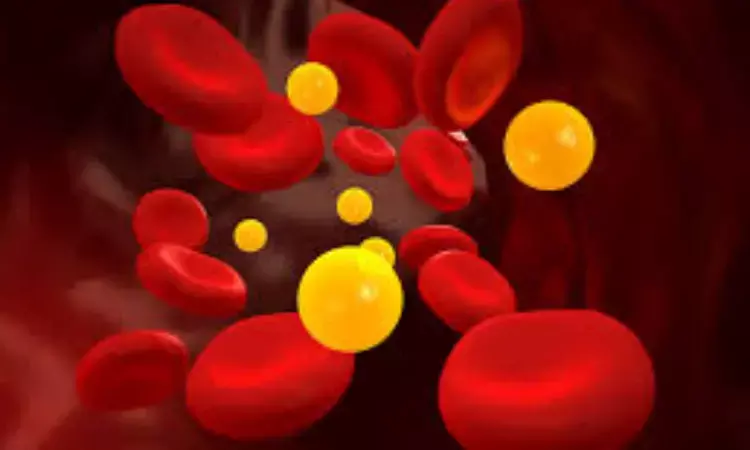- Home
- Medical news & Guidelines
- Anesthesiology
- Cardiology and CTVS
- Critical Care
- Dentistry
- Dermatology
- Diabetes and Endocrinology
- ENT
- Gastroenterology
- Medicine
- Nephrology
- Neurology
- Obstretics-Gynaecology
- Oncology
- Ophthalmology
- Orthopaedics
- Pediatrics-Neonatology
- Psychiatry
- Pulmonology
- Radiology
- Surgery
- Urology
- Laboratory Medicine
- Diet
- Nursing
- Paramedical
- Physiotherapy
- Health news
- Fact Check
- Bone Health Fact Check
- Brain Health Fact Check
- Cancer Related Fact Check
- Child Care Fact Check
- Dental and oral health fact check
- Diabetes and metabolic health fact check
- Diet and Nutrition Fact Check
- Eye and ENT Care Fact Check
- Fitness fact check
- Gut health fact check
- Heart health fact check
- Kidney health fact check
- Medical education fact check
- Men's health fact check
- Respiratory fact check
- Skin and hair care fact check
- Vaccine and Immunization fact check
- Women's health fact check
- AYUSH
- State News
- Andaman and Nicobar Islands
- Andhra Pradesh
- Arunachal Pradesh
- Assam
- Bihar
- Chandigarh
- Chattisgarh
- Dadra and Nagar Haveli
- Daman and Diu
- Delhi
- Goa
- Gujarat
- Haryana
- Himachal Pradesh
- Jammu & Kashmir
- Jharkhand
- Karnataka
- Kerala
- Ladakh
- Lakshadweep
- Madhya Pradesh
- Maharashtra
- Manipur
- Meghalaya
- Mizoram
- Nagaland
- Odisha
- Puducherry
- Punjab
- Rajasthan
- Sikkim
- Tamil Nadu
- Telangana
- Tripura
- Uttar Pradesh
- Uttrakhand
- West Bengal
- Medical Education
- Industry
Lipoprotein Apheresis Scientific Statement released by AHA

USA: The American Heart Association (AHA) has released a scientific statement The scientific statement, published in Arteriosclerosis, Thrombosis, and Vascular Biology, explores its utility, clinical outcomes, and practical implementation, providing a comprehensive overview of its role in managing patients with elevated lipoprotein levels and cardiovascular risk.
The new scientific statement has highlighted the often underused role of lipoprotein apheresis as a therapeutic option for both children and adults with familial hypercholesterolemia (FH), elevated lipoprotein(a) [Lp(a)], and high levels of low-density lipoprotein cholesterol (LDL-C).
The procedure significantly lowers LDL-C and Lp(a) levels by 65% to 85% in just one session, making it an important emerging option for patients with familial hypercholesterolemia who do not adequately respond to standard treatments, especially those at high risk for atherosclerotic cardiovascular disease (ASCVD).
In the scientific statement on lipoprotein apheresis, the writing committee, led by Dr. Laurence S. Sperling from Emory University, reviewed the procedure’s historical development, efficacy, available devices, and outcomes. They highlighted the significant underdiagnosis and undertreatment of FH, one of the most common genetic lipid disorders.
The U.S. Food and Drug Administration (FDA) has approved lipoprotein apheresis for patients with FH who have not responded to lifestyle changes and maximum tolerated LDL-C–lowering medications. This treatment, the only FDA-approved option for lowering lipoprotein(a) [Lp(a)], is specifically indicated for patients with LDL-C levels exceeding 100 mg/dL but remains underutilized among high-risk individuals struggling to control their lipoprotein levels.
The LIPOSORBER LA-15 system is designed for patients with homozygous FH (HoFH) and LDL-C levels over 500 mg/dL, as well as heterozygous FH (HeFH) patients with LDL-C levels of at least 300 mg/dL. Additionally, HeFH patients with LDL-C levels of at least 100 mg/dL, Lp(a) levels of 60 mg/dL or higher, and documented coronary or peripheral artery disease (CAD or PAD) may also benefit from this treatment.
A single session of lipid apheresis can reduce LDL-C levels by up to 85%, though maintaining these lower levels requires frequent treatments due to rapid rebound. These devices target apoB-containing lipoproteins, improving various vascular and inflammatory biomarkers.
While lipid apheresis has shown benefits such as enhanced endothelial function and reduced coagulation factors, its impact on long-term outcomes independent of lipoprotein reduction remains uncertain. Observational studies indicate that lipid apheresis can reduce major adverse cardiovascular events (MACE) by 50% to 85%, particularly in patients with elevated Lp(a) and LDL-C.
The committee emphasized that around 11,000 to 15,000 Americans with FH may qualify for lipid apheresis, yet fewer than 400 currently receive the treatment. Barriers to access include limited availability—only 33 U.S. states have lipid apheresis centers—and a lack of awareness among both patients and healthcare providers.
The annual cost of lipid apheresis ranges from $50,000 to $150,000, significantly lower than some other LDL-lowering therapies, yet the high cost, treatment frequency, and travel distance complicate patient access. The committee called for increased referrals to existing centers and the establishment of more facilities, along with enhanced patient education.
In conclusion, while lipoprotein apheresis represents a valuable option for high-risk patients, addressing barriers to access and improving awareness is crucial to ensure that more individuals can benefit from this treatment.
Reference:
Gianos E, Duell PB, Toth PP, Moriarty PM, Thompson GR, Brinton EA, Hudgins LC, Nametka M, Byrne KH, Raghuveer G, Nedungadi P, Sperling LS; American Heart Association Council on Arteriosclerosis, Thrombosis and Vascular Biology; Council on Cardiovascular and Stroke Nursing; Council on Clinical Cardiology; Council on Lifelong Congenital Heart Disease and Heart Health in the Young; and Council on Peripheral Vascular Disease. Lipoprotein Apheresis: Utility, Outcomes, and Implementation in Clinical Practice: A Scientific Statement From the American Heart Association. Arterioscler Thromb Vasc Biol. 2024 Oct 7. doi: 10.1161/ATV.0000000000000177. Epub ahead of print. PMID: 39370995.
Dr Kamal Kant Kohli-MBBS, DTCD- a chest specialist with more than 30 years of practice and a flair for writing clinical articles, Dr Kamal Kant Kohli joined Medical Dialogues as a Chief Editor of Medical News. Besides writing articles, as an editor, he proofreads and verifies all the medical content published on Medical Dialogues including those coming from journals, studies,medical conferences,guidelines etc. Email: drkohli@medicaldialogues.in. Contact no. 011-43720751


